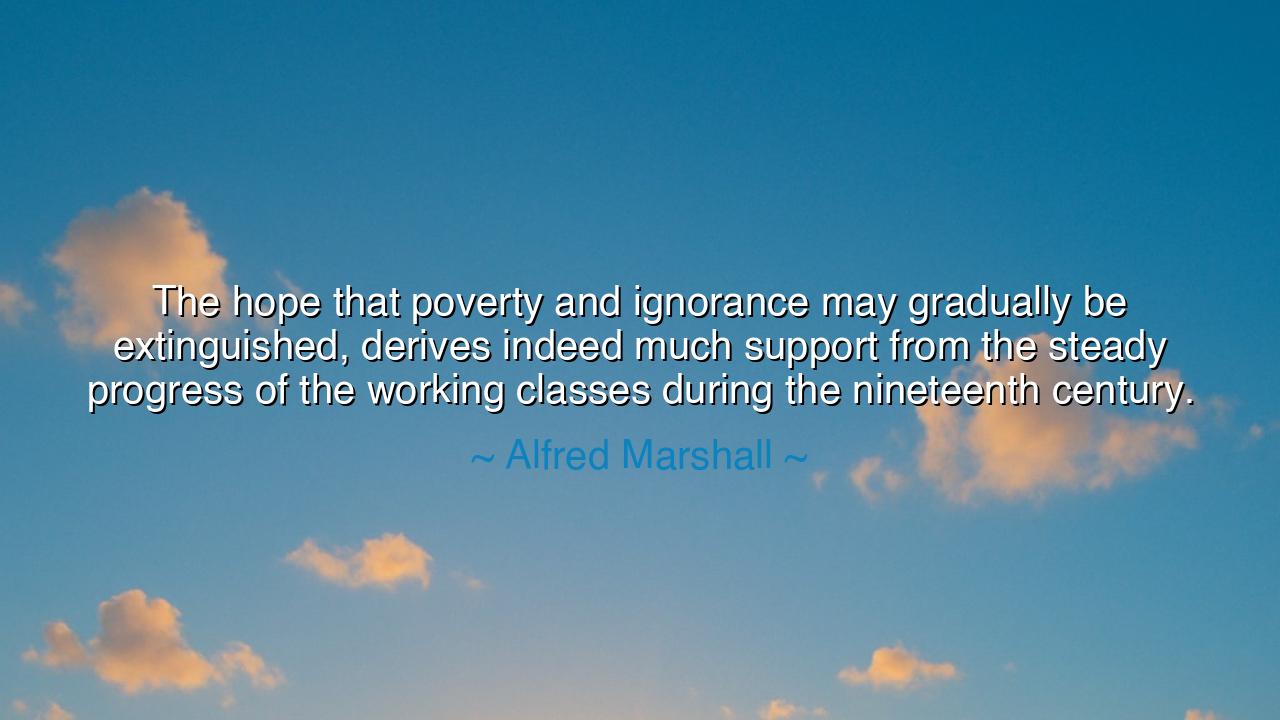
The hope that poverty and ignorance may gradually be
The hope that poverty and ignorance may gradually be extinguished, derives indeed much support from the steady progress of the working classes during the nineteenth century.






"The hope that poverty and ignorance may gradually be extinguished, derives indeed much support from the steady progress of the working classes during the nineteenth century." So spoke Alfred Marshall, one of the great architects of modern economics, whose vision reached beyond numbers and markets into the heart of human dignity. His words, though born of the nineteenth century, echo through all time—for they are not merely about wealth, but about hope, not merely about labor, but about the ascent of humanity itself. In this single sentence lies the eternal faith that mankind, through perseverance and wisdom, can rise from the dust of hardship into the light of understanding.
To grasp the soul of this saying, one must recall the age from which it came. The nineteenth century was an era of iron and fire—of factories rising like cathedrals, of cities swelling with laborers, of soot and sweat and sorrow. The working classes, who toiled unseen in the furnaces of industry, bore the weight of progress upon their backs. Yet amidst the smoke, Marshall discerned a miracle: these same laborers were learning, advancing, educating their children, saving their wages, and building for themselves a foundation that no tyrant could destroy. He saw that poverty and ignorance, those twin chains that had shackled humankind for millennia, were being slowly worn away by the patient strength of ordinary people.
It was not the nobles or the kings who carried this progress forward—it was the worker, the weaver, the miner, the machinist, the teacher, the mother tending her home and her children with faith in tomorrow. They became the builders of civilization’s second birth. Like Prometheus bringing fire to men, they brought the flame of knowledge into the common world. For as education spread and the dignity of labor grew, the old world of despair began to tremble. Marshall’s hope was not built on naïve idealism—it was grounded in the evidence of rising wages, expanding schools, and a spirit that refused to yield to misery.
Think of Andrew Carnegie, born in poverty in Scotland, who came to America as a weaver’s son and rose through toil and learning to become one of the richest men of his time. Yet it was not his wealth that made him great, but his conviction that the working man’s uplift was sacred. He built libraries across continents so that the poor could arm themselves with knowledge, for he knew—as Marshall knew—that education is the surest weapon against ignorance, and that when the mind awakens, chains fall. In such acts, we see the embodiment of Marshall’s vision: progress that begins from the ground, not the throne.
But this hope is not self-fulfilling. It is a fire that must be tended. The danger of every age is that progress breeds complacency, that we forget the struggles of those who came before. Poverty and ignorance are cunning foes; they return wherever society grows indifferent or unjust. The lesson of Marshall’s words is not to rest in pride, but to labor continually for enlightenment—to ensure that every hand has work, every child has learning, and every voice has worth. Hope must be nourished by action, just as faith must be proved by deeds.
Therefore, let all who live in comfort remember this truth: the progress of the world does not belong to the few but to the many. Each generation inherits both the victories and the unfinished struggles of those who labored before them. To despise the poor is to forget our own lineage; to neglect education is to betray our own future. We are all the descendants of toil, and our noblest duty is to lift others as we ourselves were lifted.
So take heed, O reader of these words: build where others have broken, teach where others have been denied, and work not only for your own gain, but for the rising of all. For when poverty and ignorance are diminished, the soul of humanity grows vast and radiant. Let this be the true progress of our age—not machines or empires, but compassion joined with knowledge, labor joined with love. Then, as Alfred Marshall foresaw, the long night of want will end, and the dawn of human fullness will shine upon all.






AAdministratorAdministrator
Welcome, honored guests. Please leave a comment, we will respond soon